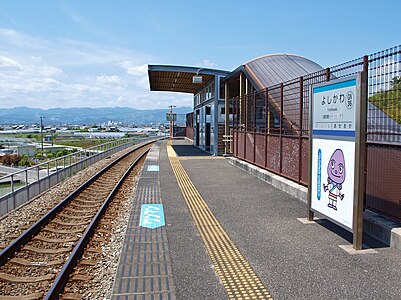Yoshikawa Station (Kōchi)
Yoshikawa Station よしかわ駅 | |
|---|---|
 Yoshikawa Station in 2010 | |
| Location | Yoshikawacho Furukawa, Konan-shi, Kōchi-ken 781-5242 Japan |
| Coordinates | 33°32′45″N 133°42′38″E / 33.545949°N 133.710431°ECoordinates: 33°32′45″N 133°42′38″E / 33.545949°N 133.710431°E |
| Operated by | Tosa Kuroshio Railway |
| Line(s) | ■ Asa Line |
| Distance | 8.0 km from Gomen |
| Platforms | 1 side platform |
| Tracks | 1 |
| Construction | |
| Structure type | Elevated |
| Other information | |
| Status | Unstaffed |
| Station code | GN36 |
| History | |
| Opened | 1 July 2002 |
| Passengers | |
| FY2011 | 22 daily |
| Location | |
 Yoshikawa Station Location within Japan | |
Yoshikawa Station (よしかわ駅, Yoshikawa-eki) is a railway station on the Asa Line in Kōnan, Kōchi Prefecture, Japan. It is operated by the third-sector Tosa Kuroshio Railway with the station number "GN36".[1][2]
Lines[]
The station is served by the Asa Line and is located 8.0 km from the beginning of the line at Gomen.[3] Only local trains stop at the station.[4]
Layout[]
The station consists of a side platform serving a single elevated track. There is no station building, but an enclosed shelter is provided on the platform. Another waiting room has been set up under the elevated structure. Access to the platform is by a flight of steps. A bike shed is provided nearby.[2][5]
Adjacent stations[]
| « | Service | » | ||
|---|---|---|---|---|
| Asa Line | ||||
| Rapid: Does not stop at this station | ||||
| Noichi | Local | Akaoka | ||
Station mascot[]
Each station on the Asa Line features a cartoon mascot character designed by Takashi Yanase, a local cartoonist from Kōchi Prefecture. The mascot for Yoshikawa Station is an eel in human form named Yoshikawa Uona (よしかわ うなお君), so chosen because eels are a noted product of Yoshikawa.[6]

A view of the station platform and track. There is a picture of the station eel mascot character under the station name board.
History[]
The train station was opened on 1 July 2002 by the Tosa Kuroshio Railway as an intermediate station on its track from Gomen to Nahari.[7]
Passenger statistics[]
In fiscal 2011, the station was used by an average of 22 passengers daily.[7]
See also[]
References[]
- ^ "Shikoku Railway Route Map" (PDF). JR Shikoku. Retrieved 23 December 2017.
- ^ Jump up to: a b "よしかわ" [Yoshikawa]. hacchi-no-he.net. Retrieved 16 February 2018.
- ^ Kawashima, Ryōzō (2013). 図説: 日本の鉄道 四国・九州ライン 全線・全駅・全配線・第1巻 四国東部エリア [Japan Railways Illustrated. Shikoku and Kyushu. All lines, all stations, all track layouts. Volume 1 Eastern Shikoku] (in Japanese). Kodansha. pp. 50, 86. ISBN 9784062951609.
- ^ "時刻表 ごめん・なはり線" [Timetable Gomen-Nahari Line] (PDF). Tosa Kuroshio Railway. Retrieved 16 February 2018.
- ^ "よしかわ" [Yoshikawa]. nacl.sakura.jp. Retrieved 16 February 2018.
- ^ "よしかわ うなお君" [Yoshikawa Uona]. gomen-nahari.com. Retrieved 16 February 2018.
- ^ Jump up to: a b Terada, Hirokazu (19 January 2013). データブック日本の私鉄 [Databook: Japan's Private Railways] (in Japanese). Japan: Neko Publishing. pp. 173, 303. ISBN 978-4-7770-1336-4.
| Wikimedia Commons has media related to Yoshikawa Station (Kochi). |
- Railway stations in Kōchi Prefecture
- Railway stations in Japan opened in 2002
- Kōchi Prefecture railway station stubs

